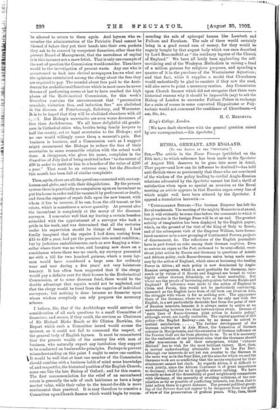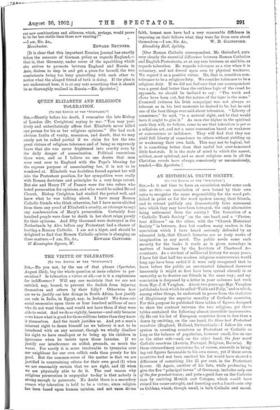RUSSIA, GERMANY, AND ENGLAND. [To THE EDITOR OD THE "SPECTATOR. " ]
Sra,—The article in the Nome Vremya (published on the 10th inst.) to which reference has been made in the Spectatoi of August 16th deserves to be gone into more in detail. That paper—and how can its influence be doubted ?—has held anti-British views so persistently that those who are convinced of the wisdom of the policy leading to cordial Anglo-Russian relations advocated by the Spectator cannot but feel a thrill of satisfaction when upon so special an occasion as the Reval meeting an article appears in that Russian organ every line of which might well have been uttered by the Spectator. I append a translation herewith UNREALISABLII DIZEA218.—The German Emperor has left the Revel roadsteads. The meeting of the mighty Monarchs is at an end, but it will evidently be some time before the comments to which it has given rise in the foreign Press will be at an end. The greatest activity of imagination has been displayed by the English papers, which, on the ground of the visit of the King of Italy to Russia, and of the subsequent visit of the Emperor William, have formu- lated surmises as to a new grouping of Continental Powers, projects of disarmament, The reflections of the English journalists have in part found an echo among their German confrires. Even so serious an organ as the Post, reckoned to be semi-official, wrote about joint action by Russia and Germany in questions of Asiatic and African policy, such Russo-German union being made neces- sary by the action of England, which aims at becoming the leading Power in Africa ; all such policy is now dominated by Anglo- Russian antagonism, which is most profitable for Germany, inas- much as by virtue of it 4ussia and England are bound to value highly either German friendship, or at least neutrality. But where are the proofs of increasing antagonism between Russia and England ? If reference were made to the action of England in China and Persia, this would not be particularly convincing, inasmuch as the English have from of old been our rivals in Asia, the struggle with whom is for us nothing new. The appearance there of the Germans; where we have so far only met with the English, is a not particularly desirable fact from the point of view of Russian interests, because it is always easier to arrive at an understanding between two than between three rivals. Dreams of ' main lines of Russo-German joint action in Asiatic policy; although sweet, are hardly realisable. The capital question of this policy—the Bagdad Railway—can by no means be solved to mutual satisfaction. . . . . . The further development of the German railway-net in Asia Minor, the formation of German colonies in Mesopotamia, and the extension of German influence on the Persian Gulf are far from pleasing to us. To ns it is necessary for the realisation of our historical aims that the Germans should suffer non-success in all their enterprises, whilst virtuous Michael' has to wish for the most brilliant victory. How, then, is mutual understanding attainable here? In the Far East, although our interests do not yet run counter to the German in the same way as in the Near East, yet the aims for which we and the Germans work are so conflicting that the means employed for their attainment cannot but clash. As regards Africa, it is difficult to work jointly, since the African Continent is of great importance to Germany, whilst for us it signifies almost nothing. We have recently spoken of the desirability of good neighbourly connections with Germany, of the necessity of avoiding collisions, of the con- ciliation as far as possible of conflicting interests, but from that to joint action there is a great distance. The present political group- ing of the Powers does not appear to be dangerous from the point of view of the preservation of gen%ral peace. Why, than, think
out new combinations and alliances, which, perhaps, would prove to be far Lass stable than those now existing?" —I am, Sir, &c., [It is clear that this important Russian journal has exactly taken the measure of German policy as regards England,— that is, that Germany, under cover of the squabbling which she strives to promote between England and Russia in Asia, desires to step in and get a piece for herself, the two combatants being too busy quarrelling with each other to notice what the alleged friend of both is doing. If the plan is not understood here, it is at any rate something that it should he so thoroughly realised in Russia.—En. Spectator.]







































 Previous page
Previous page